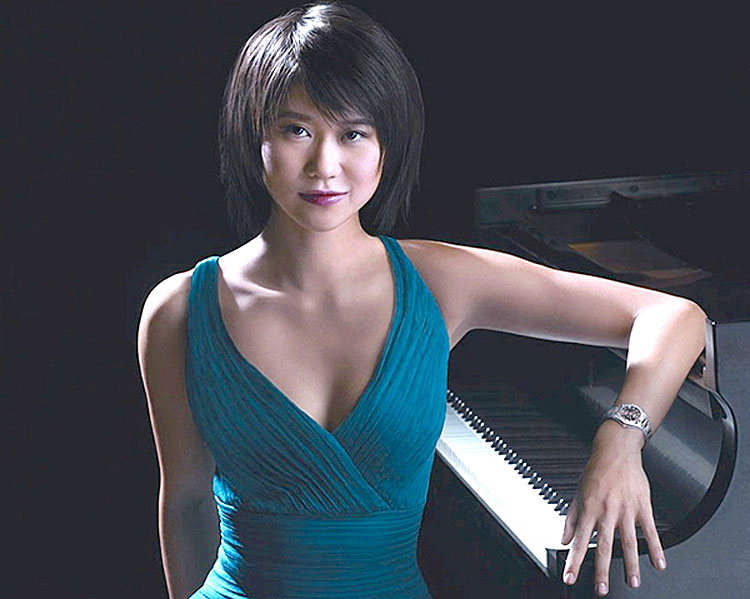By Josef Sekon

The last piano concerti by two of the greatest composers — Sergei Prokofiev’s (1891-1953) Concerto No. 5 in G Major, Op. 55 (1932) and Johannes Brahms’ (1833-1897) Concerto No. 2 in B Flat Major (1881) — were the featured works. Yuja Wang is one of those incredible pianists who appears on the classical musical scene every few years with the ability to set the keyboard on fire with her technical capacity and musical prowess to master a nearly impossible work while displaying a depth of understanding and an effortless virtuosity. She demonstrated these skills in Sunday’s concert where she was perfectly matched with Maestro Stewart’s keen ear and direction and she wore a bright green mini-skirt and her trademark 6-inch spike heels!
Prokofiev composed five concerti for piano and orchestra. Thanks to Yuja Wang, we are now becoming familiar with his fifth concerto — an amazing work! Since this was Yuja’s first performance of this most challenging work she performed from the score, but referred to it very sparingly. Yuja’s keyboard pyrotechnics lit up the keyboard in the fifth Vivo movement that featured abrupt shifts in tempo, brusque attacks, melodic cross-hand playing, glissandi and dynamics pushed the envelope to its extreme limits.
For the Brahms Yuja was elegantly attired in a lovely black and gold dress that set the stage for a performance as distinct as her attire. In 1881, more than twenty years after his Piano Concerto No. 1, Brahms composed his second concerto. This work contains some of the most deeply felt and challenging music ever written for the piano.
The work opened with a horn solo’s stately, buoyant gesture with the piano answering that set the tone and allowed listeners to prepare for the massive work in its all absorbing complexity employing huge chords that Yuja executed cleanly and crisply in true orchestral fashion.
Maestro Stewart guided the orchestra as Yuja wove melodic lines through the contrasting tumultuous and melodic textures. The expansive lyricism of the third movement provided a welcome respite with a chamber-music like triangulation between the piano, solo cello and the clarinets that shared an intimate musical and poetic relationship.
The stunningly beautiful central section cast Yuja in the light of sensitive orchestral participant rather than turgid soloist. Her chords were sharp and bright throughout. The cello/piano duet was spot on musically and orchestral balance was superbly supportive and imaginative.
The final movement opened with the piano dancing in a staccato fashion with meaningful pauses between a continuous orchestral texture. Both works were conducted without a score and the audience rose to its feet with a thunderous sense of approval and appreciation for this delightful musical treat.
After the third standing ovation, Yuja returned to perform her rendition of Rondo alla Turca from Mozart’s Piano Sonata No. 11 in A major, the version she is famous for playing as an encore.
To witness her performing this piece as an encore is an amazing experience, for it goes so way beyond even the virtuosity of Vladimir Horowitz, and it is totally over the top and constantly evolving in her own performances.
Check out her several performances of this piece on YouTube (each one is slightly different), and you will be astounded to hear how she makes an incredibly difficult piece appear as easy as child’s play.
Well done orchestra, Yuja Wang and Maestro Stewart for yet another unforgettable musical experience!